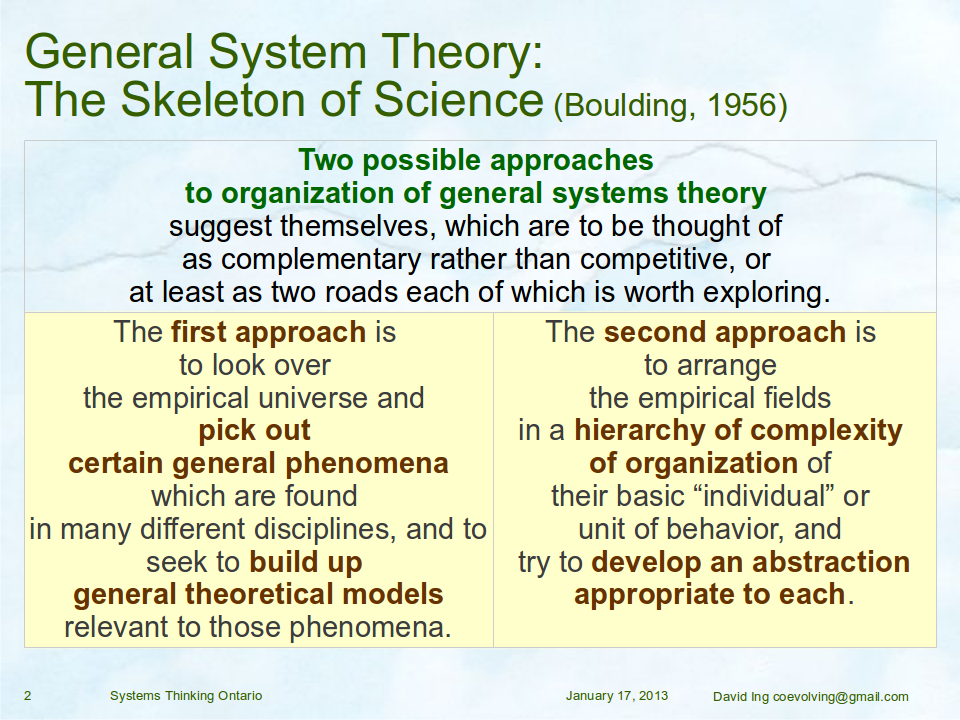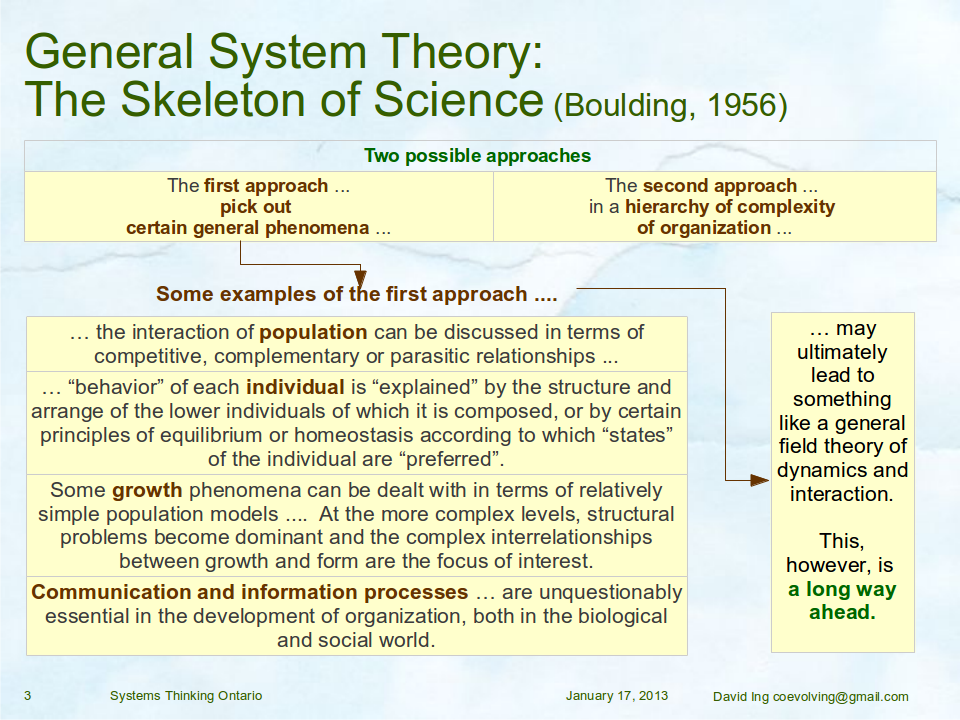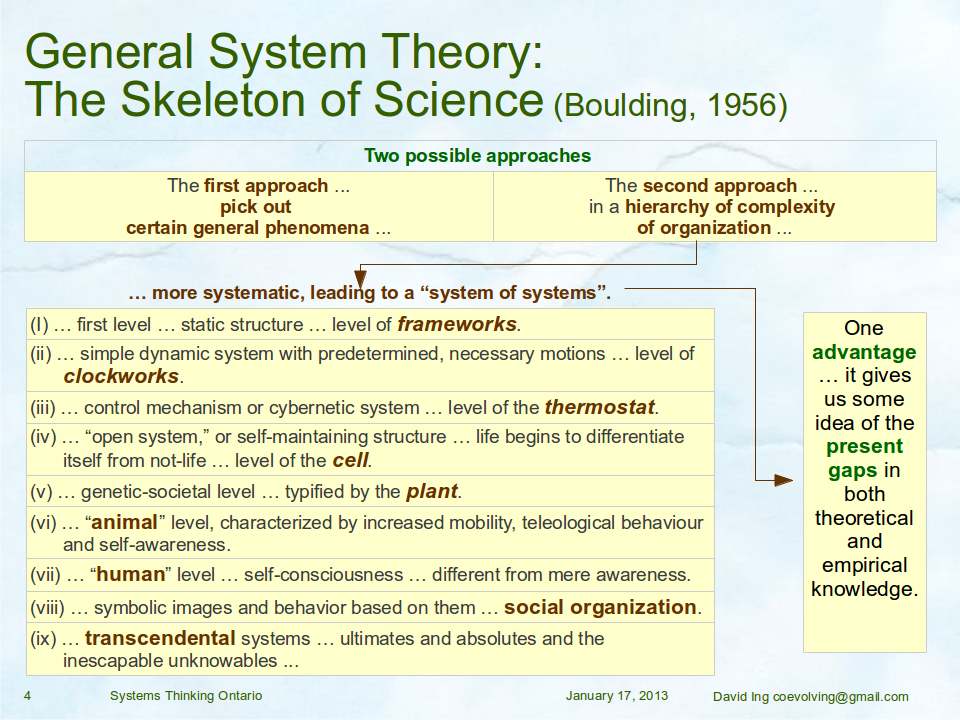The inaugural meeting of Systems Thinking Ontario convened in the Lambert Lounge at OCAD U. on the evening of January 17. The theme for the meeting was “Systems Thinking and Science”, with the focus question for the evening as: “Is the function of systems thinking to be (i) a science or (ii) a complement to science?”
The suggested pre-reading for the session was a rather old (1956) foundational article:
- Boulding, Kenneth E. 1956. “General Systems Theory — The Skeleton of Science.” Management Science 2 (3) (April): 197–208. http://jstor.org/stable/2627132 or doi:10.1287/mnsc.2.3.197 or find a cached version by searching on Google Scholar.
After a preamble on the role of Kenneth Boulding in the founding of the Society for General Systems Research (now known as the International Society for the Systems Sciences), some slides with the major points of the article were provided by attendees.
Towards a goal of organizing general systems theory, Boulding suggested two approaches: (i) looking empirically for general phenomena across disciplines, and building up general theoretical models, or (ii) arranging the empirical fields into a hierarchy of complexity of organization, while trying to develop an abstraction appropriate to each.
Examples of the first approach included the interactions of populations, behaviours of individuals, growth, and communication and information processes. Boulding saw that such an approach could lead to a general theory (of dynamics and interaction), but thought that this would be “a long way ahead”.
In the second approach, Boulding proposed a hierarchy of complexity — of (i) frameworks, (ii) clockworks, (iii) thermostat, (iv) cell, (v) plant, (vi) animal, (vii) human, (viii) social organization, and (ix) transcendental systems — that was more systematic. This “system of systems” had the advantage of giving some idea of gaps in both theoretical and empirical knowledge.
Antony Upward served as the first commenter on the article. His comments were framed in three parts: (i) how far we’ve come (since 1956); (ii) how far we’ve got to go; and (iii) how much we’ve learned in the 60-plus years since Boulding published.
- (i) From a 1956 article, there some foreshadowing of advances in science and in systems thinking:
- Hints at idea of systems dynamics archetypes (top of p. 198) — Jay Forrester became a professor at the new MIT Sloan School of Management in 1956.
- Hints at Kuhn’s ideas of development of science in fits and starts and the inertia of “normal” science (p. 198) — The Structure of Scientific Revolutions was published in 1962.
- Hints at ideas of panarchy and attractors (p. 201) — with Panarchy published by Gunderson and Holling in 2001, and Strange Attractors published by Sprott in 1993.
- Unsurprising (from our understanding today) of a very positivist orientation and conception of systems (p. 202) — Critical Systems Theory developed in Flood around 1990.
- (ii) There’s still a long way to go:
- There’s few people (and scientists) who think of systems in such a hierarchy
- The existing normal science disciplines are even more fixed, rigid, and self-perpetuating
- The need for problems to be solved through multi-disciplinarity, beyond bi-disciplinary (p.197, p.199) and ultimately trans-disciplinarity.
- (iii) In 60-plus years, the domain of systems thinking has advanced in areas that Boulding would not have had language to describe:
- e.g. non-equilibrium thermodynamics, panarchy, autopoesis, actor-network theory, abduction and retroduction, complexity science, etc.
- A Pattern Language emerging in 1977 by Christopher Alexander became popular in software development with the Hillside Group in 1993.
Allenna Leonard served as the second commenter, with ideas and additional pointers to references:
- On Boulding:
- The skeleton of science reveals gaps, especially where techniques from levels 1-3 can be applied to higher levels for improved (if partial) understanding.
- One is the gap between pure mathematics (Queen of the Sciences) and applied content-level work.
- I think of systems sciences as the “prime minister” of the sciences — getting its hands dirty, but still acting within various logical formulations and pursuing generalities and common themes and interests.
- There is lots of interest in bringing systems science down to practicalities in the workplace, but this can be difficult because some theoretical understanding is needed, and most applications require customization.
- Environmental issues came decades later.
- I was a participant with Stafford Beer and Ken Boulding in a seminar organized by (I think) Rob Hoffman and Bert McInnis at Waterloo in the 1980’s on Gro Brundtland’s ecological treatise. Both were very much in favour although neither had made ecology a central part of their work.
- The skeleton of science reveals gaps, especially where techniques from levels 1-3 can be applied to higher levels for improved (if partial) understanding.
- William Gibson wrote a book titled Pattern Recognition. Very good as well as very apt.
- A.L. (Pete) Becker was an ASC trustee who was a professor of linguistics at Michigan who specialized in Southeast Asian languages and the cultural resonances they shared. He gave a presentation about the ideographic languages and how they influenced how people thought according to their structure. He died several months ago.
- Magorah Maruyama is probably best known for his work on mindscapes, and is well worth looking at.
To increase bandwidth on interpersonal communications, the large group them broke out into smaller discussion groups. Reporters were asked to keep a few notes on the trail of their discussions.

On behalf of his discussion team, Goran Matic reported:
- We might be “scraping the surface” of systems thinking ,in terms of most of our everyday understanding of applicability – there might be much more depth to it
- “So what?” and “What’s in it for me?”– in terms of allowing the theory to help us manage highly complex systems in everyday situations and challenges
- Moving away from linearity towards the necessity of systems thinking
- The problems of yesterday were arguably “cast” in terms of linearity, even though they might not have been so, necessarily
- However, the issues of today are too large for this type of an approach, and are showing themselves more as systemic issues that they are
- What tools do we need to have to help us to manage systems, and such systemic problems?
- How do we “bridge the gap” between the theoretical and applicable?
- “Re-configuring the relationships in the traditional societies”, as a method of going back to systems thinking approaches, in societies that were close to nature
- Operational research started in WWII
- “What was enemy going to do?”
- Travelling salesman problem
- A lot more density, interaction and interdependence in all of our lives
- There is a lot more complexity – perhaps due to the fact that there is a lot more choice
- And, everything is working a lot more quickly
- Does this bring about a need for systems thinking?
- Noone knows how to use it
- “The more I know about it, the less I know what it is”
- Hegel – not about things themselves, but about the relationships between them
- It would be nice to have a case-study – systems perspective versus not
- Qualitative vs. quantitative dynamic models might be an approach that is worth considering, in areas where we may not have all the data
- Systems thinking might perhaps become a new interdisciplinary “container” for science – since science is running the risk of “outgrowing” itself, and is in a need of a new connective paradigm

In another group, Melissa Daly-Buajitti reported:
- This might have been one of earliest discussions of what interdisciplinarity could be, laying out a view of what transdisciplinarity might look like, although the language didn’t yet exist
- The two cultures, by C.P. Snow, came in 1959
- Years later, we see universities trying to be interdisciplinary – seen as a necessity for getting things done
- Each level allows us to study different wholes that are difficult to study as a while – our sciences aren’t structured to study wholes, but parts
- Disciplines could build upon one another, either in a hierarchy or a map of systems
- Did this fail because it’s too easy for the disciplines to see themselves individually?
- Examples applying Boulding’s first approach:
- Christopher Alexander in architecture
- Software engineering design pattern language
- You look for patterns – distributed cognition as a way of studying collaborative commons
- Apply this to a study of ants
- Abductive
- A way of facilitating dependency
- Macro theory of scientific change intimately wrapped up with abduction
- As things become more complex, science can’t explain on its own
- Roger Martin abduction in business [see “Management by Imagination“]
- Retroductive
- A way of back-casting: leaping ahead and looking back
- Like abduction in macro
- Competes with scientific method
- We use induction when we create patterns
- The disciplines enforce a methodology
- Rationalize – we don’t know how to talk of abduction
- The big questions don’t fit into a single discipline
- But scholars must make their ideas fit into disciplines in order to obtain a degree and have their ideas published
- Managing uncertainty
- We will need to borrow a lot from all over
- Critical pragmatism
- Abduction framed as “informed guessing” – we don’t want this association
- At page 201, Boulding calling out the gaps between levels
- At each boundary there is a universal theory waiting to be discovered (not mainstream theories – they’ve been discovered but scientists don’t use them)
- e.g. general theory of growth, panarchy
- Living systems, social systems
- Autopoeisis – self-organization (for cells through societies)
- Non-equilibrium, thermodynamics

Carl Hastrich was the reporter for the third discussion breakout group. He’s incorporated some of their conversation into his reflections on “Beginning to Learn Systems Thinking” particularly on “normal versus post-normal science” and “hard systems versus soft systems”.
To extend the discussion, the formal meeting adjourned at 8:00 p.m. to a casual restaurant on Baldwin Street for continuing informal conversations. Mixing up the group, we each had the opportunity to appreciate the contexts from which participants were coming, in their journey on systems thinking.
The format of System Thinking Ontario meetings will evolve from this first session. The program, as designed, seemed workable. Having a suggested a pre-reading and then opening with a summary review created a common context for the thinking (although some attendees missed the web links that pointed to where a softcopy of the reading might be found). Having two commenters — loosely coupled, without prior coordination — opened up the discussion to the larger focus question. The breakout discussion groups increased bandwidth for sensemaking. Asking for volunteer reporters required a little arm-twisting, and should be less of a surprise in future sessions. The desire for continuing conversation beyond the short breakout period was satisfied (for most) by adjourning to a quiet restaurant. While the facilitators were prepared with flipchart and marker supplies, these proved unnecessary. Convening the meeting in a large circle, breaking out to smaller circles, and then rejoining in the larger circle for sharing — without large scale visual aids — seemed natural.
The Systems Thinking Ontario meetings are being scheduled monthly. The setting is adapted from Design with Dialogue practices, with more self-organization and less facilitation. As more participants become comfortable with the styles and roles, it’s natural that the meeting will eventually fall into a regular pattern for sharing.





